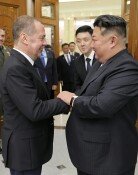FSS Chairman Pursues Economic Sense
FSS Chairman Pursues Economic Sense
Posted July. 06, 2007 03:03,
Several high-ranking government officials have shown differing opinions over president Roh Moo-hyuns remarks, which have become socially controversial as they do not make economic sense. Some expect such expressions of disagreement to lead to the beginning of a lame duck government.
Yoon Jeung-hyun, chairman of the Financial Supervisory Committee (FSC), said in a press briefing on July 5, A public hearing will be held around mid-August regarding the analysis of the credit card commission imposed on stores dealing with credit card payments. The issue should be addressed in economic terms, not in political terms. The hearing will be an opportunity to change the commission cost to the level where economic players are not worried about market-driven cost.
When asked whether his remarks meant he was unwilling to approach the issue in a political way, as pursued by the President, he emphasized, Believe me, only economic sense will work.
The FSS chairmans remarks stand in stark contrast to President Rohs emphasis on politics. On June 27, the president said in a meeting regarding the effect of traditional market policy, The commission issue will not be resolved with financial expertise. A political mindset should come into play.
During the meeting, Kim Seok-dong, deputy minister of Finance and Economy, said to the President, We have discussed the issue through meetings and reviewing other countries cases. To which Mr. Roh responded, That is useless. The issue needs to be faced the Korean way.
Mr. Yoon also criticized the current policy banning industrial capital from acquiring financial capital in the same briefing. He said, Financial capital does not increase overnight. It is foolish to prevent industrial capital from enter the financial market.
With just a month left in his term, the FSS chairman has publicly expressed his market-driven and business-friendly stance, which is rare among the current cabinet ministers. As a consequence, it has led to a clash in opinions with several officials in power.
Earlier, Kim Shin-il, deputy prime minister and minister of Education and Human Resources Development (MOE), shifted his position in a meeting with the Korean Council for University Education (KCUE) on July 4, saying, I will pursue the gradual implementation of a government-set college admission policy to increase the share of high school Grade Point Average (GPA) to 50 percent.
MOE said the ministers change in position was the result of consultation with Cheong Wa Dae. However, some suggest that the changed stance contradicts the Presidents claim and the policy may change again after the President, who is in Guatemala City campaigning Pyeongchangs bid, returns home.
Mr. Roh had blamed university presidents for their admission policies in a discussion with them in the presidential office in June 26. He said, If Seoul National University insists that it will give all applicants in first and second level group a 100 percent score, the government is left only to impose responding measures on the school.
Justice Minister Kim Seong-ho also expressed his opposition against president Roh who claimed the Article 9 of Election Law (public servants obligation to remain neutral on election) unconstitutional at the National Assembly session on June 11.
Though he did set preconditions at that time by saying the matter could be interpreted in numerous ways, such an expression of his own opinion led to rumors of his pending dismissal.
Kim Jae-hoon, professor at Seoul National University of Technology, said, With presidential candidates from ruling parties undecided, the President has strongly expressed his opinion. Though a lame duck has not yet surfaced, his strong stance has been less effective than his early term in office.
Politicians claim that the President may reshuffle his cabinet to take control of the public sector at the end of his term after sensing a changing atmosphere.







